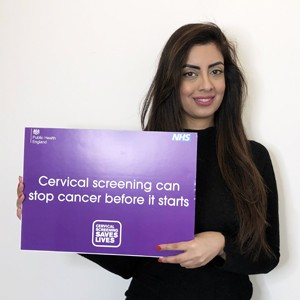- Number of women attending cervical screening falls to a 20-year low
- Two women die every day of cervical cancer in England
- Research from PHE finds that 9 out of 10 women would take a test that could help prevent cancer, but 1 in 4 do not attend their cervical screening
Public Health England (PHE) has launched a new national campaign, ‘Cervical Screening Saves Lives’, to increase the number of women attending their cervical screening across England. The campaign encourages women to respond to their cervical screening invitation letter, and if they missed their last screening, to book an appointment at their GP practice.
Around 2,600 women are diagnosed with cervical cancer in England each year and around 690 women die from the disease – that’s two deaths every day. It is estimated that if everyone attended screening regularly, 83% of cervical cancer cases could be prevented.
New research from PHE shows that nearly all women eligible for screening (90%) would be likely to take a test that could help prevent cancer, and of those who have attended screening, nine in 10 (94%) would encourage others who are worried to attend their cervical screening. Despite this, screening is at a 20-year low, with one in four eligible women (those aged 25 – 64) in the UK not attending their test.
The new PHE campaign provides practical information about how to make the test more comfortable and gives reassurance to women, who may be fearful of finding out they have cancer, that screening is not a test for cancer. Regular screening, which only takes a few minutes, can help stop cervical cancer before it starts, as the test identifies potentially harmful cells before they become cancerous and ensures women get the right treatment as soon as possible.
The PHE research shows that once they have been screened, the vast majority of women feel positive about the experience, with eight in 10 (87%) stating they are glad they went and that they were put at ease by the nurse or doctor doing the test (84%).
Professor Anne Mackie, Director of Screening Programmes at PHE said: “The decline in numbers getting screened for cervical cancer is a major concern as it means millions of women are missing out on a potentially life-saving test. Two women die every day in England from cervical cancer, yet it is one of the most preventable cancers if caught early.
“We want to see a future generation free of cervical cancer but we will only achieve our vision if women take up their screening invitations. This is a simple test which takes just five minutes and could save your life. It’s just not worth ignoring”.
Dr Archana Dixit, Consultant Obstetrician and Gynecologist, West Middlesex University Hospital, Chelsea & Westminster Hospital NHS Foundation Trust comments: “Attending regular cervical screening is one of the most important things women can do to protect themselves from getting cervical cancer. I strongly feel that it’s crucial to get this message across to South Asian women so that they recognise that screening can stop cancer before it starts and thus save lives. Coming from the same community, I believe that I have an understanding of some of the barriers to testing within the South Asian community and hence would like to dispel some of the misunderstandings around this.
Many women in South Asian communities, like other women are nervous or embarrassed about the test and hence put off having it done. Some fear the test might be uncomfortable but the nurse doing the test will talk to you about your concerns and help put you at ease. There is also a perception that it’s promiscuous women that need the test or the belief that it’s not necessary if you’ve only had one partner. That’s not the case and I would like to stress the importance of not ignoring your screening letter – it’s a five minute test that could be lifesaving.”
Radio presenter Noreen Khan said: “It’s simple, cervical screening save lives. When I get my reminder in the post, I don’t just put the letter to one side, I’ll call the GP surgery and make my appointment otherwise it’s too easy to forget and get busy with life. Once I’ve had my test it gives me peace of mind for a few years. I’d urge all you ladies not to ignore the crucial cervical screening test which could potentially save your life.”
Actress Sunetra Sarker says: “I was so surprised to find out that two women die every day of cervical cancer in England, even though it is one of the most preventable cancers. I know that there are so many reasons why women, and especially Asian women, avoid going for their cervical screening test. I hope this campaign will encourage Asian women to be more open about discussing cervical screening and get tested.”
The campaign is also being supported by charities, including Jo’s Cervical Cancer Trust. Activity includes new advertising on TV and other channels, together with the cascade of information through GP surgeries and pharmacies.
For further information about cervical screening, please search ‘NHS Cervical Screening’ or visit www.nhs.uk/cervicalscreening.


















